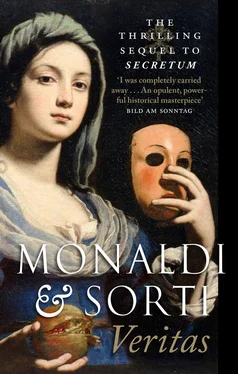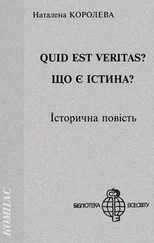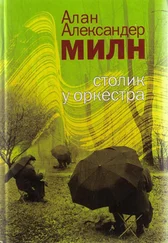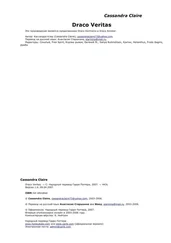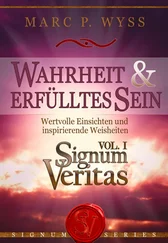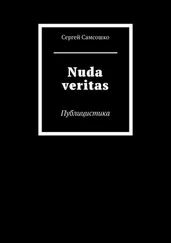Rita Monaldi - Veritas
Здесь есть возможность читать онлайн «Rita Monaldi - Veritas» весь текст электронной книги совершенно бесплатно (целиком полную версию без сокращений). В некоторых случаях можно слушать аудио, скачать через торрент в формате fb2 и присутствует краткое содержание. Жанр: Исторический детектив, на английском языке. Описание произведения, (предисловие) а так же отзывы посетителей доступны на портале библиотеки ЛибКат.
- Название:Veritas
- Автор:
- Жанр:
- Год:неизвестен
- ISBN:нет данных
- Рейтинг книги:3 / 5. Голосов: 1
-
Избранное:Добавить в избранное
- Отзывы:
-
Ваша оценка:
- 60
- 1
- 2
- 3
- 4
- 5
Veritas: краткое содержание, описание и аннотация
Предлагаем к чтению аннотацию, описание, краткое содержание или предисловие (зависит от того, что написал сам автор книги «Veritas»). Если вы не нашли необходимую информацию о книге — напишите в комментариях, мы постараемся отыскать её.
Veritas — читать онлайн бесплатно полную книгу (весь текст) целиком
Ниже представлен текст книги, разбитый по страницам. Система сохранения места последней прочитанной страницы, позволяет с удобством читать онлайн бесплатно книгу «Veritas», без необходимости каждый раз заново искать на чём Вы остановились. Поставьте закладку, и сможете в любой момент перейти на страницу, на которой закончили чтение.
Интервал:
Закладка:
Spannagel asks himself: why was Joseph not able to participate in the military campaign of 1703? The answer is highly significant. Within the court there were those who wanted to keep him at home, and not for good reasons. The motives adduced for this opposition (Codex 7713, p. 105, c. 239r and ff.) were, of course, “the lack of necessary things” and the “insufficiency of the revenue”, as well as the “considerable number of enemies” together with the “abundance of all things they had to make war well”. But this did not explain everything, says Spannagel. One must also consider whether the men who were in charge of political and military affairs on the imperial side were really giving of their best. “Such an examination and comparison would be a bold, odious and arduous enterprise,” because it would also be necessary to “scrutinise the will, spirit and heart, which have hundreds and hundreds of inscrutable expedients”. So inscrutable that Joseph’s true friends had some doubt whether “the enemies were served with much greater fidelity than were the Emperor and the King of the Romans; and that without this defect there would never have been so many difficulties and so many disasters.”
In short, someone was playing the traitor. Or at least, was consciously avoiding doing his duty. For what reason? In the end, it came down to the lack of “good harmony” between Joseph and his father’s ministers, as well as “some kind of jealousy”, on account of which the ministers closest to Leopold were “on their guard against ministers of the rising sun” — that is to say, Joseph’s ministers. But according to these latter, the only way to “preserve the House of Austria from final ruin” was for “the King of the Romans to be able to put into effect great things, worthy of his noble talents”. If anything was to change, and if there was to be a real shift of direction at the head of government, Joseph’s star needed to shine brightly at last: exactly what had begun to happen at the capture of Landau in 1702.
Spannagel, whose date of birth is not known, but who probably died in 1749 (Ig. Fr. V. Mosler, Geschichte der k.k. Hofbibliothek zu Wien , Vienna 1835, p. 148) was a contemporary of Joseph I, and had been present at many of the events he reports. He could have spoken by hearsay, or he could have cited oral testimony, but from extreme scrupulousness he cites (Codex 7713, pp. 124-26; Appendix to Book V–Letter Z) documentary sources provided by the Chancellor himself: letters from Prince Salm, Joseph’s old educator, to the Count of Sinzendorf during the early months of 1703. Here there are open references to the “bad designs of this government”, and to the “extreme necessity” of a change in the ministers and the urgency to replace them with “capable people, upright and accredited, who can alter things and stop abuses”. Writing to Sinzendorf, Salm adds bluntly that “given the hostility of the present government towards the King of the Romans, until this is changed, I say frankly that I cannot advise the King to join the military campaign.”
Therefore it is true, as the preceptor of Charles’s family says, that Joseph was the victim of “bad designs” — or, to put it more bluntly, of envy. For this reason he was prevented from going to war in 1703, and hence from making his star blaze anew.
Charles did not like the biography of Josefo il vittorioso, Re et Imperadore dei Romani, Re di Ungheria e di Boemia e Arciduca d’Austria . Negotiations were soon held. Through the Chancellor, Charles suggested some cuts to Spannagel (Codex 8434, papers 280-86), above all, the part explaining why Joseph was prevented from going to war himself in the 1703 campaign: an affair that Spannagel had reconstructed also thanks to documents provided by the Chancellor, reproduced in the appendix to the work. Despite his sovereign’s insistence, Spannagel courageously refused to make any cuts, because that would have jeopardised the integrity of the work. He might eventually take the advice given, but only after completing the work.
But something else disturbed the Emperor. The historian must apologise (Codex 8434 papers 297r-298v e 292r) for having “made a mistake” in describing Charles’s education: it is not true that he defined it as “modest”. In any case, the passage would be immediately corrected, and Spannagel recorded that he was still awaiting documents that he had requested in order to describe the youthful years of the current emperor more accurately.
Spannagel was perhaps too courageous, too keen to tackle delicate subjects, and perhaps he unwittingly committed the crime of lèse majesté . The seed of envy is always fresh: in the end the historian was never received by the Emperor, and his biography was never to be published.
Perhaps in an attempt to ingratiate himself with the Emperor, Spannagel began to write a history of the reign of Charles himself, in Latin. But the work was never completed, and the pages of the work actually devoted to Joseph’s brother (cf. Susanne Pum, Die Biographie Karls VI. Von Gottfried Philipp Spannagel. Ihr Wert als Geschichtsquelle , unpublished dissertation, Vienna 1980) are ridiculously few. The historian who had loved Joseph must have found it hard to appreciate Charles.
The censoriousness of the successor of Joseph the Victorious did not end here. In 1715, four years after Joseph’s death, Charles had already carried out a singular operation: he assigned two functionaries to go through all the correspondence preserved in the desks and in other furniture belonging to his father Leopold and his deceased brother. This meticulous examination lasted almost four months (from 28th January to 20th April, and from 26th August to 19th September).
In the end, having received the list of documents, Charles ordered that a large portion of them be burned, personally noting, page by page, which papers must not be passed down to his descendants: primarily, anything of personal or family interest. The State Archive of Vienna still holds the careful record of this examination with Charles’s annotations (Haus-, Hof- und Staatsarchiv, Familienakten, Karton 105 n.239). What is striking, among the private papers of Joseph listed by the functionaries, is the great number of letters and memoirs concerning Landau: a simple glance is enough to show just how important the double triumph in Bavaria was for the young condottiere . Among the papers sent to the bonfire were dozens and dozens of letters between Joseph and Charles, between the brothers and their father and their wives, plus many more whose contents are not clear. When it is a matter of personal correspondence, the following words are written in the margin: “burn so it does not reach the public.”
Why had such a great mass of documents been abandoned for four years? (This is even odder when one considers that not only papers but also jewels are listed among the items examined.) What mysterious force drove Charles to destroy so many valuable family memories? Was the truth of the relations between the two brothers concealed there? Or was there something revealing about Joseph’s death? The bonfire Charles ordered means that we will never know the answer to these questions.
Atto Melani
The news of the arrival of a certain Milani in Vienna at the beginning of April, which the chimney-sweep tells us that he read with amazement in the newspaper, is not invented. According to the Wiennerisches Diarium of 8-10 April 1711, page 4, on 8th April a certain Signor Milan, an official of the imperial post from Milan, entered the city by the so-called Scottish Gate, and he settled at the post station. ( Schottenthor. . Herr Milan / kayserl. Postmeister / komt auß Italien / gehet ins Posthauß ). Anyone in Vienna can check this item at the National Library, or in the city library of the Rathaus, as with all other quotations from newspapers of the day.
Читать дальшеИнтервал:
Закладка:
Похожие книги на «Veritas»
Представляем Вашему вниманию похожие книги на «Veritas» списком для выбора. Мы отобрали схожую по названию и смыслу литературу в надежде предоставить читателям больше вариантов отыскать новые, интересные, ещё непрочитанные произведения.
Обсуждение, отзывы о книге «Veritas» и просто собственные мнения читателей. Оставьте ваши комментарии, напишите, что Вы думаете о произведении, его смысле или главных героях. Укажите что конкретно понравилось, а что нет, и почему Вы так считаете.
